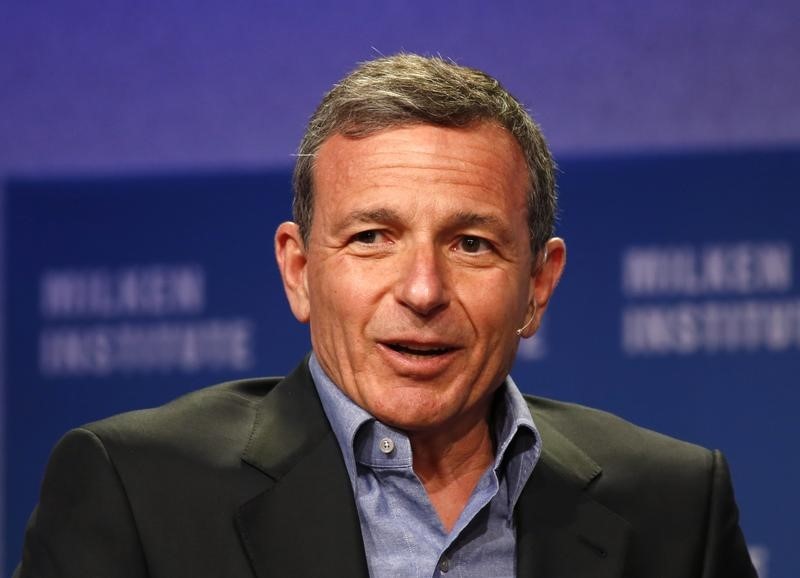By Ross Kerber
BOSTON (Reuters) - U.S. companies often pay their CEOs far too much compared with their lowest-paid workers as boards of directors compete to compensate their top executives more than peers.
That harsh critique actually comes from one of Corporate America's friends.
"It would be healthier for our society if CEOs were paid less," said Michael Kagan, who oversees about $9 billion in assets as a senior portfolio manager at ClearBridge Investments in New York. "You have this arms race, where people look at peers to see the pay is fair, so pay is raised year after year."
Even though Kagan's vehicles like the ClearBridge Appreciation Fund
Kagan's comments mark a rare exception to the stance of most mutual fund executives to not discuss executive pay in detail. Still, that could be changing as years of debating compensation rates at U.S. companies make professional investors more comfortable talking about the subject, said Stephen Brown, a corporate governance consultant and former head of the Society of Corporate Secretaries and Governance Professionals.
"I wouldn't be surprised if you see more portfolio managers start to talk about it as they get more used to it," said Brown, adding that Kagan's remarks on CEO pay were the most critical he could recall from a mainstream fund manager. Plus, it's easier to talk about CEO pay when companies are well-run, Brown said. "What he's voicing is this reality that when you perform, people have less to complain about with pay."
Critics say the funds industry could do more to restrain CEO compensation. That view is shared by Barney Frank, the former Massachusetts congressman and an architect of the widely held advisory votes on pay.
Median pay for CEOs of S&P 500 companies reached $10.3 million in 2014, from $7 million in 2009, according to compensation data firm Equilar. Equilar spokesman Dan Marcec said more than 90 percent of the S&P 500 benchmark pay against at least one peer group and usually try to pay their CEOs above the median.
With $118 billion under management at March 31, ClearBridge is the largest equity unit of Baltimore asset manager Legg Mason Inc (N:LM). Kagan said his comments on pay equality reflect his personal views, though he also helps set ClearBridge proxy voting policies.
Data compiled by London research firm Proxy Insight show ClearBridge funds voted "against" management in companies' advisory votes on pay 8 percent of the time in the 2014 proxy season.
MORE AGGRESSIVE
That was more aggressive than some rival fund firms like Vanguard Group, Fidelity Investments and T. Rowe Price, which all opposed management about 5 percent of the time.
Kagan said ClearBridge often votes as recommended by proxy adviser Institutional Shareholder Services, supplemented by its own reviews.
He cited the case of software maker Splunk Inc (O:SPLK), whose CEO Godfrey Sullivan received a total of $17 million for the 12 months ended January 31, 2014. Kagan called the pay for Sullivan and other executives too high for a company with revenue of $303 million in that period.
"We called them and said, come on, you can't pay yourselves this much money," Kagan said. After a majority of shareholders voted against the pay Splunk recast its compensation so Sullivan made just $1 million in the next fiscal year, and forfeited shares worth $14.5 million.
Kagan said ideally CEOs shouldn't make more than 20 or 30 times what their lowest-paid workers get, and that he challenges some peer comparisons. Broader fixes like rule changes are needed to reform a CEO pay system he called "fundamentally rigged to ever rising compensation."
Kagan declined to discuss most proxy votes cast by his funds, not wanting to alienate the company managers with whom he often speaks. He said his focus on governance benefits fund performance by helping drive companies like Hess Corp (N:HES) and Occidental Petroleum (N:OXY) to improve results.
For the five years through July 9 ClearBridge Appreciation had an annualized return of 14.30 percent, beating only 38 percent of peers according to Morningstar. Over ten years it's beaten 78 percent of its peers, reflecting its aim of protecting investors during downturns.
Not aggressive by all measures, ClearBridge funds support company director candidates relatively often.
Also, the most recent votes disclosed in securities filings show ClearBridge Appreciation fund supported the pay of executives at top holdings. These include Walt Disney Co, (N:DIS) which paid CEO Robert Iger $34.3 million for the fiscal year ended September 28, 2013, and Comcast Corp (NASDAQ:CMCSA), where CEO Brian Roberts got $31.4 million in 2013.
Kagan said both executives earn their keep, even though they are overpaid in comparison to their lowest-paid workers.
But, he said, "Do they deserve to be paid a ton? Yes, given their performance."
Shares of both Disney and Comcast have more than tripled from their level five years ago.
